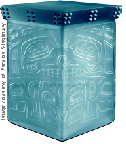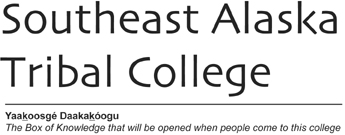

Board of Directors
Andy Hope
Ronn Dick
Marion Berry
Cecelia Tavoliero
Carlton Smith
Phyllis Carlson
Sue Stevens
Lee Wallace
Mary Duncan
Joyce Shales
Ed Warren
Administration
Ted Wright, Interim President
Elder Advisors
Joe Hotch
Dennis Demmert
Nora Dauenhauer
Jim Walton
Marie Olson
Lydia George
Isabella Brady
Gil Truitt
Charles Natkong, Sr.
Arnold Booth
Contact
(907) 586-1625
(907) 790-4406
(907) 723-8536
tedtrmp@aol.com
andy@ankn.uaf.edu
Sealaska Heritage Institute curriculum projects
Goals: Promoting the use of Tlingit language and academic success of Tlingit students.Population: varies with the project (see below)
Program Summary: Three projects will be funded:
K-2 curriculum development for a partial immersion classroom.Tlingit language immersion camp for teachers, teaching assistants working in partial immersion classrooms, or for parents. Two 10-day retreats - one at Dog Point Fish Camp near Sitka and one at Glacier Bay Lodge.
Funding: SHI received 3 substantial federal grants.
Contact: Roy Iutzi-Mitchell
Tlingit Classroom
Goals: Culturally-based classroom, increased academic success, increased school readiness.Population: K-3 students, mostly Tlingit or other Alaska Native, American Indian
Program Summary: Started in 2000 with 18 students in grades K-1. Has grown to 45 students in two classrooms (K-1 and 2-3). Classroom teacher partners with a cultural specialist (Nancy Douglas) - both have spent considerable time and energy on curriculum development. Classroom has an elder/fluent Tlingit speaker who visits regularly. Program shows success - engaged students, engaged families, students meeting core requirements.
Funding: Grant was not renewed; JSD has picked up support for the program
Gear-up
Goal: The GEAR UP grant offers our district additional funding to promote post-secondary opportunities and increase achievementPopulation: Low-income middle school students (85% of our Juneau participants also have minority cultural backgrounds).
Program Summary: The GEAR UP acronym stands for "Gaining Early Awareness and Readiness for Undergraduate Programs." This school year's activities include career exploration and informational-gathering field trips to the university and to attend the college/career fair. Students and parents will also be invited to evening events where counselors explain postsecondary education programs and financial aid opportunities.
Funding: This federal grant funding will continue through next school year, ending June of 2004.
Kimberly Homme, GEARUP Grant Coordinator
Juneau School District [mail: 10014 Crazy Horse Drive]
463-1700 ext 330
hommek@jsd.k12.ak.us
Camp WATER
Goal: Increased awareness of science and/or math career options. Improve academic success of Alaska Native students.Population: Middle school students in the Juneau School District (both Native and non-Native)
Program Summary:
Camp WATER is a summer science/culture camp.
W -Wilderness
A - Adventure
T - Traditions
E - Explorations
R - ResearchFunding: It has been run under various grants for a total of five summers. Grant was not renewed - may have enough carry forward funds to offer camp one more year.
Barriers
Goals: partnerships w/families, assist families to improve nutrition, attendance, and improve behavior while in school, staff development on equity, early adolescent development, and expanded strategies, and provide support for families as students transition between grade levels and schools.Population: Dzantik'I Heeni Middle School, Floyd Dryden Middle School and Riverbend Elementary School.
Grant has funded: breakfast program at DZ and RB, afterschool tutoring and activity buses at RB, purchased planners for each student at DZ, purchased school supplies for each student on free/reduced lunch at DZ, support for Tlingit language class, Alaska Native art class at DZ, staff development - teachers attended TRIBES training.
Funding: Next year grant will fund only the VISTA volunteer position.
Contact: Les Morse
South East Regional Resource Center ANSWER Camp
ANSWER Camp provides a series of two-week summer retreats to meet the need for culturally relevant science and math enrichment for 7th and 8th grade students living in rural Alaska Native villages and communities.ANSWER Camp makes math and science instruction more meaningful by connecting local values, cultures, and concerns to western scientific principles.
Traditional Native ways are honored and scientific concepts are explored in the context of village life. Alaska Native students are better prepared to enter village high schools and to meet the challenges of a rapidly changing world as a result of their participation in ANSWER Camp.
Linking western science applications to real life village experiences makes education come alive and motivates students to continue their education: I see science all around me. ANSWER Camp helped me learn that I can put Western and Native science together (Ruby, ANSWER Camp, 1998).
Project goals and outcomes are measurable:
GOAL ONE: Alaska Native middle school students will demonstrate improved skills and attitudes regarding school and science as a result of participation in summer camp that focuses on culturally appropriate, community-based science and math enrichment.
Objective One: Campers will demonstrate a 20% increase in school attendance.
Objective Two: 95% of students will indicate significantly improved attitudes about science and mathematics as a result of participation in ANSWER Camp activities.
Objective Three: All students will meet or exceed performance standards established for culturally based science and mathematics units of study implemented during ANSWER Camp.
Objective Four: 95% of students will indicate increased aspirations for the future, including student plans to finish high school and go to college.
Objective Five: 25% of Campers will demonstrate improved semester science grades in the semester immediately following ANSWER Camp.
GOAL TWO: Parents, mentors and teachers of Alaska Native middle school students will be involved in science and math enrichment programs through the participation with students in activities provided by the Parent/Mentor Support Coordinator.
Objective One: 80% of parents or mentors of ANSWER Camp students will help their child excel in science and mathematics through hands-on activities, video viewing and discussion and participation in audio-conferences.
Objective Two: Before ANSWER Camp, all campers' parents, mentors and science teachers will be individually informed regarding the goals, objectives, and outcomes for Camper participation.
Objective Three: 80% of parents, mentors and teachers will attend and participate in local Science Olympiads organized by campers and science teachers.
Objective Four: 100% of village-based middle school science teachers will provide individualized assistance to students and their families leading to excel in science and mathematics.
ANSWER Camp is a proven summer enrichment project designed to provide cultural relevance and cultivate high interest in math and science, increase academic success, build parent support skills, and have a positive impact on the educational aspirations of rural Native middle school students.
To receive more information regarding ANSWER Camp contact Sheryl Weinberg at (907)586-6806 or Patrick Henry at (907)349-0651.
--
Sheryl Weinberg
Associate Director
South East Regional Resource Center
210 Ferry Way
Juneau, AK 99801
(907)586-6806
Southeast Alaska Native Science Fair
Goals:Population: Students in grades 6-12 enrolled in southeast Alaskan school districts.
Program Summary:
Funding:
Contact:
Angie Lunda
Dzantik'I Heeni Middle School
10014 Crazy Horse Dr.
Juneau, AK 99801
907-463-1899
lundaa@jsd.k12.ak.us
Early Scholars Program
Goals: Increase the number of Alaska Native students attending college; provide academic support for those studentsPopulation: 36 Alaska Native students in grades 9-12 at JDHS; recommended by a teacher; maintain a 2.0 GPA or higher
Program Summary: Students take a college trip every year. The ESP is supported by a strong parent group. Very successful - most students do go on to attend college or some other post-secondary training.
Funding: Program is funded jointly between JSD and UAS.
Contact: Paula Dybdahl
I Am Salmon project
Goals:Population: Middle School students in Southeast Alaska
Funding: Seattle-based organization One Reel. Grant is exhausted - looking for new funding.
Curriculum project - Study of local watershed around the Pacific Rim - looking at the cultural significance of salmon in various regions
Teachers Teaching Tlingit - Dick Dauenhauer
Goal: Incorporate Tlingit language instruction into Juneau school district classrooms; familiarize teachers with Tlingit pronunciation and orthography
Population: K-12 certified teachers in the Juneau School District
Program Summary: Over the past five years the Dauenhauers have taught JSD teachers about the Tlingit language and assisted with curriculum projects. Many of these projects are available on the JSD website. Supported by the JSD. Question for this year: start with a new cadre of teachers or continue on with the original cohort to build and expand the curriculum?
Contact: Peggy Cowan
Salmon Subsistence curriculum project
A preliminary proposal for funding has been submitted to the Southeast Sustainable Salmon Fund (SSSF) to develop an interactive, place-based curriculum and resource materials on subsistence salmon. The proposed curriculum will provide a multicultural understanding of the importance, history, science, management, issues, harvest and processing patterns, and distribution methods of Southeast Alaska subsistence salmon fisheries. The project will include curriculum modules with educational activities, resources and background information; 2-4 page informational sheets on specific topics; multi-media learning kits; an oral and visual salmon lexicon in English, northern and southern Tlingit, Haida, and Tsimpsian; a multi-media, interactive website; video clips to be used in the website and learning kits; and teacher training to be conducted both on-site in selected communities and as a university accredited workshop in Juneau. A searchable database of traditional ecological knowledge on salmon, being developed through another research grant, will be incorporated into the curriculum. This project will involve a major collaboration between the Alaska Department of Fish and Game; Dzantik'I Heeni Middle School teachers, Native elders and educators; Alyeska Central School and others to provide culturally and regionally appropriate educational materials on subsistence salmon.Funds were requested for three years for this project. During the first year, a collaborative relationship with selected communities and organizations will be developed to assess what is already being accomplished concerning salmon and subsistence education in these communities, consult with Native "clan mothers" and video record their thoughts on salmon subsistence, determine the details concerning the curriculum modules, resource materials, website, and learning kits and begin to create the resource materials. The draft modules and multi-media material s will be created and pilot tested in three communities during the second year. The third year will accomplish teacher training, on-site dissemination to selected communities, evaluation of the curriculum and materials, and incorporation of necessary revisions; and final production and distribution. Alyeska Central School would be responsible for ongoing dissemination of curriculum materials and maintenance of the website. The cost to develop the curriculum was estimated to be $400,000 over the three years. The educational working group of SSSF met on October 23, 2002 to identify their goals and objectives and have not yet discussed the subsistence salmon curriculum proposal.
Juneau Indian Studies Program
Goals:Population: K-12 students in the Juneau School District
Program Summary:
Funding:
Contact: